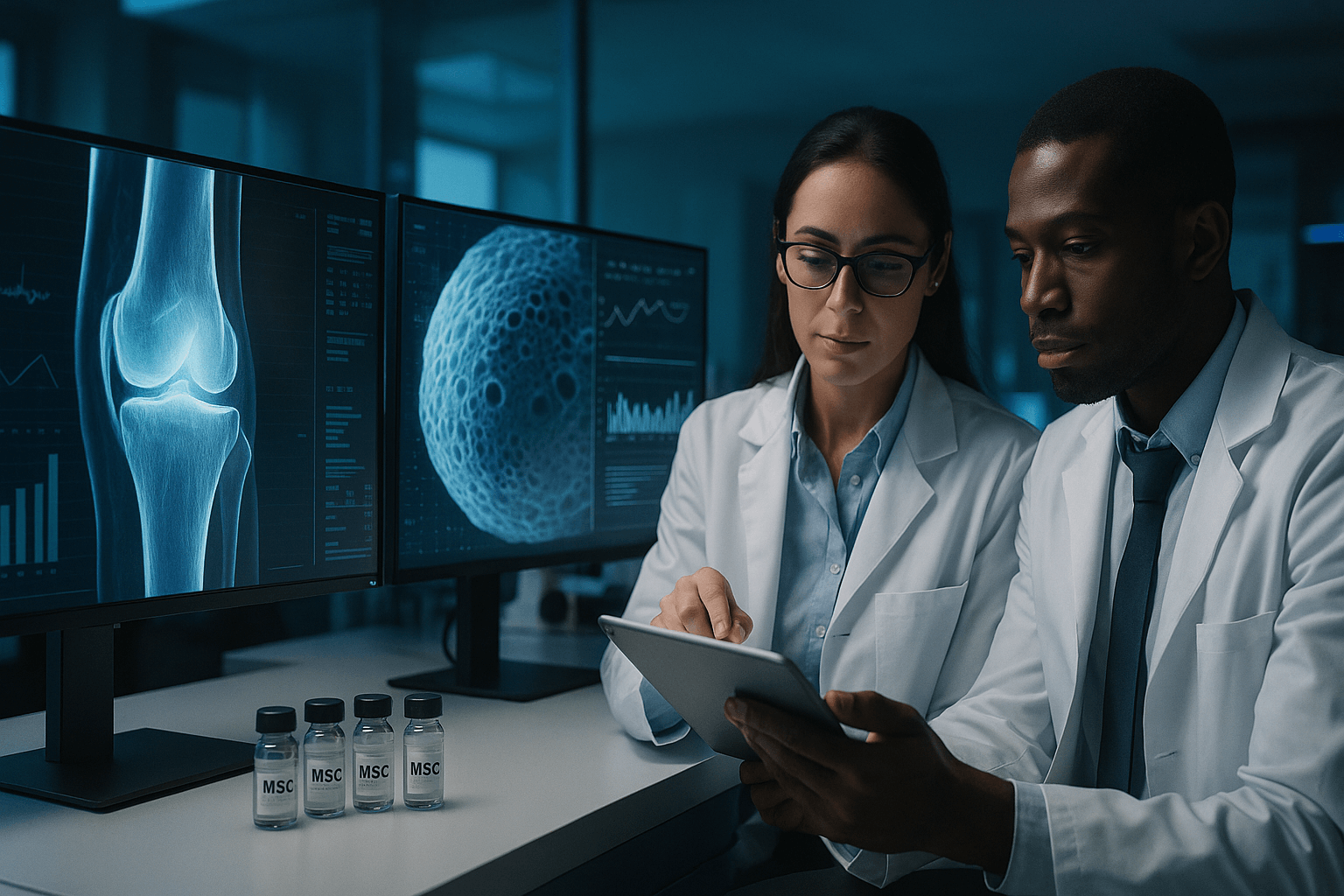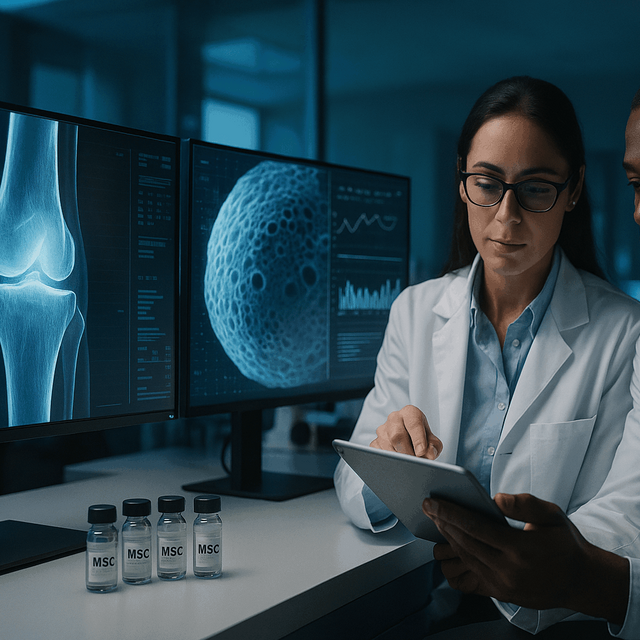Florida's New Stem Cell Law: What It Means for Regenerative Medicine & Your Family's Future
Key Takeaways
Florida's landmark stem cell law (HB 1617) creates new, regulated pathways for advanced therapies within the U.S., potentially ending the era of medical tourism for certain conditions. This shift highlights the growing importance of MSC-rich cord and placental tissues, making private banking a more tangible investment in a family's future health.
By Marty Smithmyer, CEO, Americord Registry
Marty Smithmyer, the Founder and CEO of Americord, embarked on his journey in 2008 inspired by a deeply personal experience – the preservation of his own daughter's cord blood stem cells. Recognizing a critical gap in the field, Marty has wholeheartedly dedicated his life and career to revolutionizing cord blood banking and regenerative medicine for families nationwide.
A New Era for Stem Cell Therapy in the U.S.
For more than a decade, a frustrating paradox has defined American regenerative medicine. While our nation’s scientists led the world in cellular research, our patients were forced to fly abroad—to clinics in Panama, Mexico, or the Caribbean—to access promising therapies their own doctors could not legally provide. This medical exodus represented not only a potential risk to patient safety but also a significant loss of clinical data and economic opportunity.
Today, that paradigm is shifting. Landmark legislation in Florida, with growing momentum in states like Texas, signals a pivotal moment. The United States is beginning to create regulated, state-level pathways for advanced stem-cell therapies, potentially ending the era of outbound medical tourism and ushering in a new age of domestic innovation.
FDA Stem Cell Regulations: 361 vs. 351 Pathways
To appreciate this shift, we must first understand the federal framework that has governed cell-based products. The U.S. Food and Drug Administration (FDA) categorizes human cells, tissues, and cellular and tissue-based products (HCT/Ps) into two main pathways:
- 361 HCT/Ps: These are products that are "minimally manipulated" and intended for "homologous use" (performing the same basic function in the recipient as in the donor). Think of traditional bone marrow or cord blood transplants for blood disorders. These products are regulated for safety, primarily to prevent the transmission of communicable diseases, but do not require pre-market approval.
- 351 HCT/Ps: These are products that are more than minimally manipulated (e.g., culture-expanded) or intended for non-homologous use. The FDA regulates these as drugs or biologics, requiring extensive, multi-phase clinical trials to prove safety and efficacy—a process that can take many years and hundreds of millions of dollars.
Many of the most promising applications for mesenchymal stem cells (MSCs)—the versatile cells found in abundance in umbilical cord tissue and placenta—fall into the 351 category. This has meant that while world-class researchers established successful clinics in more permissive regulatory environments, U.S. progress remained confined to lengthy clinical trials. The resulting vacuum was filled by high-profile stories of athletes and public figures who traveled abroad for treatments, highlighting the immense pent-up demand here at home.
Florida’s New Stem Cell Law (HB 1617) Explained
Effective July 1, 2025, Florida’s new Stem Cell Therapy Act (HB 1617)1 creates a bold but structured exception. It authorizes board-licensed allopathic (MD) and osteopathic (DO) physicians to provide investigational stem-cell therapies outside of FDA-approved trials, provided they adhere to strict safety and transparency standards.
Key provisions include:
- Source Integrity: Cells must be sourced from facilities that are FDA-registered and accredited by the Association for the Advancement of Blood & Biotherapies (AABB)4.
- Manufacturing Standards: The cell processing must comply with federal Current Good Manufacturing Practice (cGMP)3 standards, ensuring purity, potency, and consistency.a
- Informed Consent: Patients must be given a plain-language summary of the procedure, its potential risks and benefits, and its investigational nature, and provide written informed consent.
- Ethical Sourcing: The law explicitly prohibits the use of embryonic stem cells, focusing on non-controversial sources like donated umbilical cord and placental tissue.
- Physician Oversight: Treatments must fall within the physician's established scope of practice (e.g., an orthopedist treating a joint).
How Florida and Texas are Leading the "Right-to-Try" Movement
Florida’s law, perhaps the most comprehensive of its kind, does not exist in a vacuum. It builds on a legislative trend pioneered by states like Texas, which passed its own "Right-to-Try" law for stem cells (HB 810)2 back in 2017. That law created a pathway for patients with chronic or terminal diseases to access investigational treatments under Institutional Review Board (IRB) supervision.
By creating a clear framework for a broader patient population, Florida is now the leading edge of this movement. It establishes a powerful proving ground that could generate the critical safety and efficacy data needed to inform future federal policy.
Scientific Evidence Supporting Cord Tissue Stem Cells (MSCs)

These legislative changes are happening in parallel with an explosion of encouraging clinical data, particularly for umbilical cord-derived MSCs (UC−MSCs) in treating orthopedic conditions.
- Clinical Efficacy: A robust March 2024 meta-analysis published in the Journal of Orthopaedic Surgery and Research, covering 507 patients with knee osteoarthritis, found that intra-articular injections of UC−MSCs led to statistically significant improvements in both pain and function (as measured by WOMAC scores) compared to placebo or hyaluronic acid, with no serious adverse events reported.5
- Tissue Regeneration: A 2022 randomized controlled trial in Stem Cell Research & Therapy went a step further.6 It not only confirmed pain and function benefits but also used high-resolution MRI to demonstrate a statistically significant preservation of cartilage volume in the treated group at 12 months, suggesting a true disease-modifying effect.
- Real-World Application: In the U.S., clinics operating under these new state frameworks are already reporting positive outcomes. Early reports from pioneering clinics describe significant reductions in osteoarthritis pain scores, and the new regulatory clarity is catalyzing partnerships between treatment centers and biopharmaceutical labs to establish on-site programs for orthopedic and neurological applications.
Why Florida’s Law Makes Cord Blood & Tissue Banking Essential
The new law in Florida places a non-negotiable emphasis on cell quality, requiring cGMP3 processing and sourcing from FDA-registered, AABB-accredited4 facilities. This is precisely the high standard that private cord blood and tissue banks like Americord have upheld for years.
When your family banks your newborn’s cord blood and, crucially, cord and placental tissue, you are securing a personal, pristine source of two powerful types of stem cells:
- Hematopoietic Stem Cells (HSCs) from cord blood, which are FDA-approved to treat over 80 conditions, mostly cancers and blood disorders.7
- Mesenchymal Stem Cells (MSCs) from cord and placental tissue, which are the primary focus of the new regenerative medicine applications in orthopedics, autoimmune conditions, and inflammatory diseases.
Banking ensures you have an autologous source (a perfect genetic match for your child) and a haploidentical source (a partial match for family members), eliminating the risk of immune rejection and the need to search for a suitable donor.
How New State Laws Impact Your Family’s Health Future
- Expanded Future Use Within the U.S.: The therapies being explored under Florida's law—for knee osteoarthritis, soft tissue repair, and autoimmune disorders—could one day become accessible treatment options for your family, using your own banked cells, without needing a passport.
- The Power of Cord Tissue: This development dramatically elevates the importance of banking cord tissue and placenta, the body's richest sources of MSCs. Banking the tissue alongside the blood secures a more diverse toolkit for future medical needs.
- Supply Chain Certainty: Private banking gives your family direct ownership and control over your unique stem-cell assets. You will know exactly where they are, how they were processed, and that they are available when you need them.
- Regulatory Momentum: As Florida successfully and safely collects treatment data through patient registries, the pressure on other states and federal agencies to modernize and harmonize regulations will only grow.
Americord's Commitment to Transparent Pricing
Choosing a private bank is also a financial decision. Americord is committed to transparent and affordable pricing. While some cord blood banks charge significant annual storage fees, Americord offers both annual plans (where fees may apply in some cases) and one-time payment options for long-term storage, allowing families to choose the plan that best fits their budget. Pricing is subject to change, and for the most up-to-date information, we encourage you to visit our pricing page.
Important Considerations for Investigational Stem Cell Therapies
It is critical to remember that these state-authorized therapies are still investigational. Biology is complex, and results are not guaranteed. As you explore this new terrain, I urge every patient and family to:
- Verify Credentials: Insist that any clinic is using cells from an FDA-registered, AABB-accredited4 lab that adheres to cGMP3 standards.
- Demand Transparency: Ask for the clinic's treatment protocol, how they track outcomes, and if their data is reviewed by an IRB or published.
- Distinguish Between "Approved" and "Authorized": Understand the difference between a therapy with full FDA approval and one being offered under a state-authorized investigational framework.
- Consult a Specialist: Always discuss your options with a qualified medical professional who understands your specific health needs and any co-existing conditions.
Future-Proof Your Family’s Health with Americord
I believe we are at the dawn of a renaissance in American regenerative medicine—one that thoughtfully balances patient access with rigorous scientific standards. At Americord, our mission has always been to empower families to future-proof their health. With Florida’s new pathway illuminating the potential of MSCs, the value of preserving your child’s cord blood and tissue has never been more tangible or more compelling.
The door to domestic regenerative medicine is opening. By banking today, you are securing your family’s key to that door.
References
- Florida House Bill 1617 (2025): "An act relating to the use of stem cells." Full text available from the Florida Senate. https://www.flsenate.gov/Session/Bill/2025/1617
- Texas House Bill 810 (2017): "An act relating to the use of adult stem cells." Full text available from the Texas Legislature Online. https://capitol.texas.gov/tlodocs/85R/billtext/html/HB00810F.HTM
- FDA - Current Good Manufacturing Practice (CGMP) Regulations: An overview of the FDA's manufacturing quality standards. https://www.fda.gov/drugs/pharmaceutical-quality-resources/current-good-manufacturing-practice-cgmp-regulations
- Association for the Advancement of Blood & Biotherapies (AABB): Information on AABB accreditation for cellular therapies. https://www.aabb.org/accreditation
- Liu, C., et al. (2024). Efficacy and safety of umbilical cord mesenchymal stem cells for knee osteoarthritis: A systematic review and meta-analysis of randomized controlled trials. Journal of Orthopaedic Surgery and Research, 19(1), 195. https://pmc.ncbi.nlm.nih.gov/articles/PMC11194387/
- Park, Y. B., et al. (2022). Efficacy and safety of umbilical cord mesenchymal stem cells for knee osteoarthritis: a prospective, randomized, double-blind, controlled trial. Stem Cell Research & Therapy, 13(1), 458. https://pmc.ncbi.nlm.nih.gov/articles/PMC9216498/
- Americord Registry: A list of diseases treatable with hematopoietic stem cells from cord blood. https://production.americordblood.com/cord-blood-uses-and-treatments/
Disclaimer: This blog post is for informational purposes only and does not constitute medical advice. Consult with a qualified healthcare professional for any medical concerns or before making any decisions related to your health or treatment. The field of regenerative medicine is investigational and rapidly evolving.




